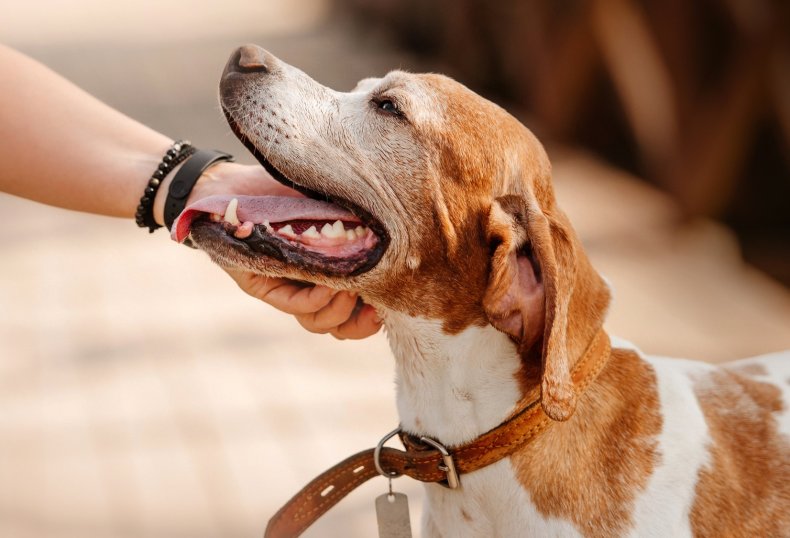
Guidance is available for pet owners after researchers reported that a dog with a confirmed case of monkeypox might have caught the virus from humans.
In a study published in The Lancet medical journal, researchers in France described how two cohabiting men who have sex with men visited a health care center complaining of anal ulcerations around six days after having sex with other partners. Both men also suffered lack of energy, headaches and a fever.
The men were diagnosed with monkeypox. Around 12 days after their symptoms appeared, their 4-year-old male Italian greyhound also developed skin lesions and tested positive for monkeypox.

Ksenia Raykova/Getty
The men said that they sometimes slept alongside their dog, leading the researchers to suggest that the dog may have caught the virus from them.
Monkeypox in animals is not unheard of. On the contrary, the virus is thought to have originated in animals in the first place, making it a zoonotic infection. However, the original host is not yet known.
“Monkeypox is a zoonotic infection for which the animal reservoir has not been found despite having been identified in 1958 in monkeys and in 1970 in humans,” Chloe Orkin, professor of HIV medicine at Queen Mary University of London, told Newsweek. “This speaks to the scientific neglect and lack of research into diseases that affect people in the Global South.
“It is known to infect small rodents especially in sylvatic regions and seems to infect this reservoir readily. In the USA, prairie dogs, a type of rodent kept as pets, were infected by coming into contact with animals originating from Ghana.”
However, throughout the 2022 monkeypox outbreak, it has been unknown whether or not domesticated cats and dogs can catch and spread the virus. The French researchers said their findings “should prompt debate on the need to isolate pets from monkeypox virus-positive individuals” and they called for further research into secondary transmission via pets.
On August 12, the CDC updated its “Monkeypox in Animals” page which currently states that dogs can be infected with monkeypox. The same page states that it is “unknown” whether cats can also catch it.
Regardless, the CDC states: “We should assume any mammal can be infected with Monkeypox virus.”
The news may lead to concerns among pet owners as to what precautions they can take to prevent their pets from becoming infected with monkeypox.
Dr. Jimmy Whitworth, professor of international public health at the London School of Hygiene and Tropical Medicine, told Newsweek it is “certainly plausible” that humans with monkeypox could infect their pets through close contact, which could theoretically lead to further spread in animal populations.
Whitworth added: “The risk of humans infecting pets seems to be low as we have not seen many reports of this, but it would be sensible to take precautions and if you think you might be infected, to avoid direct close contact with your pet, such as stroking, cuddling, or kissing it. If possible, get somebody else to feed it.”
Orkin pointed to the U.K.’s Department for Environment, Food and Rural Affairs, which published monkeypox guidelines for pet owners back in June.
One section states that pets should be kept away from infected people as much as possible until that person has ended their isolation period, and that if the pet is a rodent, rabbit or other exotic small animal, then it should be kept in its cage.
Meanwhile the CDC has published information for pet owners on its website as well, which states that people with monkeypox should avoid contact with animals, including pets.
“If the person with monkeypox did NOT have close contact with pets after symptom onset, ask friends or family members who live in a separate home to be the animal’s caretaker until the person with monkeypox fully recovers. Close contact includes petting, cuddling, hugging, kissing, licking, sharing sleeping areas, and sharing food.
“If you have monkeypox and must care for your healthy pets during home isolation, wash your hands, or use an alcohol-based hand rub, before and after caring for them. It is also important to cover any skin rash to the best extent possible (i.e., long sleeves, long pants), and wear gloves and a well-fitting mask or respirator while providing care for your animals.”
It also states that some people, for example people who are immunocompromised, pregnant, have young children present under eight years of age, or with a history of atopic dermatitis or eczema, should not provide care for animals who had close contact to a person with monkeypox as they may be at increased risk for severe disease.
Information on monkeypox transmission in general can be found on the CDC’s website.

Comments
Post a Comment